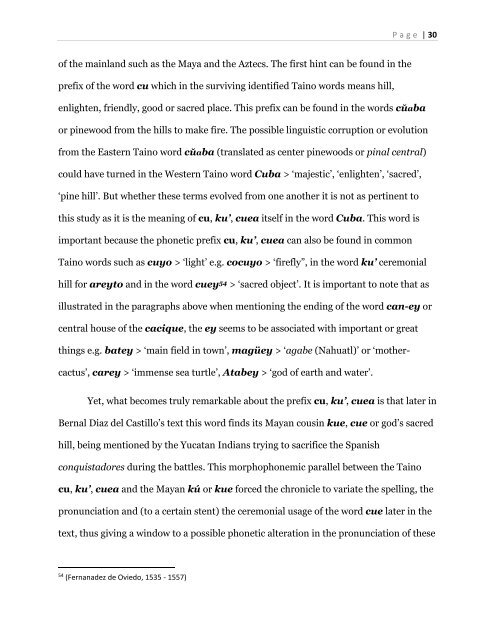Language of the Voiceless: Traces of Taino Language, Food, and Culture in the Americas From 1492 to the Present
by Leonardo Nin
by Leonardo Nin
Create successful ePaper yourself
Turn your PDF publications into a flip-book with our unique Google optimized e-Paper software.
P a g e | 30<br />
<strong>of</strong> <strong>the</strong> ma<strong>in</strong>l<strong>and</strong> such as <strong>the</strong> Maya <strong>and</strong> <strong>the</strong> Aztecs. The first h<strong>in</strong>t can be found <strong>in</strong> <strong>the</strong><br />
prefix <strong>of</strong> <strong>the</strong> word cu which <strong>in</strong> <strong>the</strong> surviv<strong>in</strong>g identified <strong>Ta<strong>in</strong>o</strong> words means hill,<br />
enlighten, friendly, good or sacred place. This prefix can be found <strong>in</strong> <strong>the</strong> words cŭaba<br />
or p<strong>in</strong>ewood from <strong>the</strong> hills <strong>to</strong> make fire. The possible l<strong>in</strong>guistic corruption or evolution<br />
from <strong>the</strong> Eastern <strong>Ta<strong>in</strong>o</strong> word cŭaba (translated as center p<strong>in</strong>ewoods or p<strong>in</strong>al central)<br />
could have turned <strong>in</strong> <strong>the</strong> Western <strong>Ta<strong>in</strong>o</strong> word Cuba > ‘majestic’, ‘enlighten’, ‘sacred’,<br />
‘p<strong>in</strong>e hill’. But whe<strong>the</strong>r <strong>the</strong>se terms evolved from one ano<strong>the</strong>r it is not as pert<strong>in</strong>ent <strong>to</strong><br />
this study as it is <strong>the</strong> mean<strong>in</strong>g <strong>of</strong> cu, ku’, cuea itself <strong>in</strong> <strong>the</strong> word Cuba. This word is<br />
important because <strong>the</strong> phonetic prefix cu, ku’, cuea can also be found <strong>in</strong> common<br />
<strong>Ta<strong>in</strong>o</strong> words such as cuyo > ‘light’ e.g. cocuyo > ‘firefly”, <strong>in</strong> <strong>the</strong> word ku’ ceremonial<br />
hill for arey<strong>to</strong> <strong>and</strong> <strong>in</strong> <strong>the</strong> word cuey 54 > ‘sacred object’. It is important <strong>to</strong> note that as<br />
illustrated <strong>in</strong> <strong>the</strong> paragraphs above when mention<strong>in</strong>g <strong>the</strong> end<strong>in</strong>g <strong>of</strong> <strong>the</strong> word can-ey or<br />
central house <strong>of</strong> <strong>the</strong> cacique, <strong>the</strong> ey seems <strong>to</strong> be associated with important or great<br />
th<strong>in</strong>gs e.g. batey > ‘ma<strong>in</strong> field <strong>in</strong> <strong>to</strong>wn’, magüey > ‘agabe (Nahuatl)’ or ‘mo<strong>the</strong>rcactus’,<br />
carey > ‘immense sea turtle’, Atabey > ‘god <strong>of</strong> earth <strong>and</strong> water’.<br />
Yet, what becomes truly remarkable about <strong>the</strong> prefix cu, ku’, cuea is that later <strong>in</strong><br />
Bernal Diaz del Castillo’s text this word f<strong>in</strong>ds its Mayan cous<strong>in</strong> kue, cue or god’s sacred<br />
hill, be<strong>in</strong>g mentioned by <strong>the</strong> Yucatan Indians try<strong>in</strong>g <strong>to</strong> sacrifice <strong>the</strong> Spanish<br />
conquistadores dur<strong>in</strong>g <strong>the</strong> battles. This morphophonemic parallel between <strong>the</strong> <strong>Ta<strong>in</strong>o</strong><br />
cu, ku’, cuea <strong>and</strong> <strong>the</strong> Mayan kú or kue forced <strong>the</strong> chronicle <strong>to</strong> variate <strong>the</strong> spell<strong>in</strong>g, <strong>the</strong><br />
pronunciation <strong>and</strong> (<strong>to</strong> a certa<strong>in</strong> stent) <strong>the</strong> ceremonial usage <strong>of</strong> <strong>the</strong> word cue later <strong>in</strong> <strong>the</strong><br />
text, thus giv<strong>in</strong>g a w<strong>in</strong>dow <strong>to</strong> a possible phonetic alteration <strong>in</strong> <strong>the</strong> pronunciation <strong>of</strong> <strong>the</strong>se<br />
54<br />
(Fernanadez de Oviedo, 1535 - 1557)


















